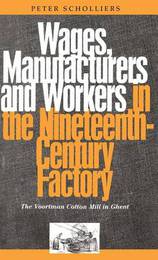
|
Wages, Manufacturers and Workers in the Nineteenth-Century Factory: The Voortman Cotton Mill in Ghent
Hardback
Main Details
| Title |
Wages, Manufacturers and Workers in the Nineteenth-Century Factory: The Voortman Cotton Mill in Ghent
|
| Authors and Contributors |
By (author) Peter Scholliers
|
| Physical Properties |
| Format:Hardback | | Pages:256 | | Dimensions(mm): Height 216,Width 138 |
|
| Category/Genre | Labour economics
Economic history |
|---|
| ISBN/Barcode |
9781859730935
|
| Classifications | Dewey:331.1251677210949309 |
|---|
| Audience | | Tertiary Education (US: College) | | Professional & Vocational | |
|---|
| Illustrations |
illustrations, bibliography, index
|
|
Publishing Details |
| Publisher |
Bloomsbury Publishing PLC
|
| Imprint |
Berg Publishers
|
| Publication Date |
1 January 1996 |
| Publication Country |
United Kingdom
|
Description
Wages have always been a major expense for businesses. This fascinating book studies the impact of spiralling wage demands in a cotton factory in Ghent during the 19th century and the efforts of management to reduce this cost through investment in new technology and stricter employment policies. The workers' responses to wage cutting are also considered. The importance of this study lies in its unique collection of wage data -- more than 200 pay books and 100 ledgers from the Voortman cotton factory -- which show, in great detail, the hourly, daily and yearly wages for all categories of workers between 1835-1913. Various aspects of wages are addressed including: changing living and working conditions; wages of women and children in relation to the 'family wage economy'; wage comparison between workers at Voortman and workers in other industries and regions; productivity, purchasing power and industrial relations.
Author Biography
Peter Scholliers is Lecturer in History at the Vrije Universiteit Brussel, Belgium.
Reviews'Scholliers's grim story of Voortman's century-long reliance on low-wage competition vividly conveys the harsh logic of nineteenth-century capitalism.' Economic History Review "The abiding value of this work lies in its firm basis in original sources. The rich mass of business archives ... is here presented in accessible form to the dedicated scholar. A superb series of statistics ... (provides) historians with a positive treasury of valuable information. ... The work deserves to reach a readership extending beyond the circles of those interested in the history of business, labour and of textiles." Besprechungen "The book provides a well-focused analysis of the problems of the 1970s and it is readily accessible to undergraduates of economics and history. It provides an important supplement to those texts dealing with the half-century since the war." Business History "the author has made this study of real importance to both economic and social historians who are interested in long-term developments, on a micro-level as well as in the framework of regional and international comparative history." Business History "unusually rich archival material... (a) fascinating account" Labour History Review "As so often, historical truth is in the detail, and Scholliers presents a wealth of it. The ability to follow living strategies at individual and household level makes this a welcome contribution to the literature on household strategies." International Review of Social History "Scholliers - with the help of his rich sources - goes far beyond earlier analyses. Yes, such company strategies and worker responses have been demonstrated elsewhere, but with much less ingenious probing of the evidence; the conclusions of this study are more solidly based and persuasive than any of which I know. Schollier's study describes "another" Ghent, different from the exemplary union town and the model municipal socialist administration with which we have long been familiar." International Labor and Working-Class History 'a well-documented study that throws greater light on European industrialisation in the nineteenth century, a subject about which there are still questions left unanswered and gaps to fill.' The Journal of European Economic History
|